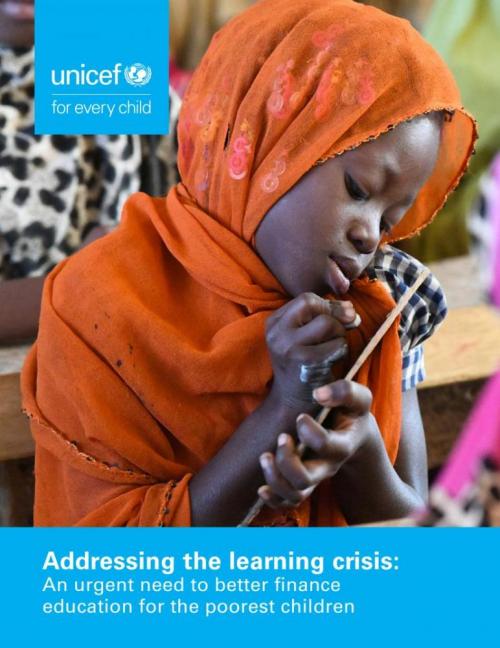
https://www.unicef.org/press-releases/1-3-adolescent-girls-poorest-house...
DAVOS/GENEVA/NEW YORK, 20 January 2020 – Nearly 1 in 3 adolescent girls from the poorest households around the world has never been to school, according to a new UNICEF paper launched today as education ministers gather at the Education World Forum and as leaders prepare to convene at the World Economic Forum Annual Meeting.
Poverty, discrimination due to gender, disability, ethnic origin or language of instruction, physical distance from schools and poor infrastructure are among the obstacles that continue to prevent the poorest children from accessing quality education. Exclusion at every step of education perpetuates poverty and is a key driver of a global learning crisis.
The paper Addressing the learning crisis: an urgent need to better finance education for the poorest children highlights major disparities in the distribution of public education spending. Limited and unequally distributed funding results in large class sizes, poorly trained teachers, lack of education materials and poor school infrastructure. This in turn has an adverse impact on attendance, enrolment and learning.
“Countries everywhere are failing the world’s poorest children, and in doing so, failing themselves,” said UNICEF Executive Director Henrietta Fore. “As long as public education spending is disproportionately skewed towards children from the richest households, the poorest will have little hope of escaping poverty, learning the skills they need to compete and succeed in today’s world, and contributing to their countries’ economies.”
Looking at 42 countries with available data, the paper finds that education for children from the richest 20 per cent of households are allocated nearly double the amount of education funding than children from the poorest 20 per cent of households.
Ten countries across Africa account for the highest disparities in education spending, with four times as much funding allocated to the richest children compared with the poorest. In Guinea and the Central African Republic – countries with some of the world’s highest rates of out-of-school children – the richest children benefit from nine and six times, respectively, the amount of public education funds than the poorest children.
Barbados, Denmark, Ireland, Norway and Sweden are the only countries included in the analysis that distribute education funding equally between the richest and poorest quintiles.
The paper notes that the lack of resources available for the poorest children is exacerbating a crippling learning crisis, as schools fail to provide quality education for their students. According to the World Bank, more than half of children living in low- and middle-income countries cannot read or understand a simple story by the end of primary school.
The paper sets out clear guidelines for governments:
- Within domestic resources allocation, funds must be distributed so that children from the poorest 20 per cent of households benefit from at least 20 per cent of education funding.
- Prioritize public funding for lower levels of education – where the children from the poorest households are most represented – and gradually increase allocations to higher levels when coverage is close to universal at lower levels.
- Provide at least one year of universal pre-primary education for every child. Pre-primary education is the foundation upon which every stage of schooling relies. Children who complete pre-primary learn better, are more likely to stay in school and contribute more to their economies and societies when they reach adulthood. Allocating at least 10 per cent of national education budgets will help achieve universal access.
“We are at a critical juncture. If we invest wisely and equitably in children’s education, we have the best possible chance of lifting children out of poverty by empowering them with the skills they need to access opportunities, and create new ones for themselves,” said Fore.
###
Full Report: https://www.unicef.org/reports/addressing-learning-crisis-2020
Although more children than ever are enrolled in school, far too many are not learning. A key factor that affects quality of education is the availability of public funding. Underinvestment in education can result in several conditions that negatively impact how and what children learn. This advocacy brief presents data and analysis on education funding from 42 countries and highlights major disparities in the distribution of public education funding. The brief notes that the lack of resources available for the poorest children is exacerbating a crippling learning crisis, as schools fail to provide quality education for their students. It calls on governments and key stakeholders to urgently address equity in education funding and presents specific actions required to achieve equitable quality education for every child.
Notes to editors
- The data point on adolescent girls from the poorest households refers to girls aged 10-19 years-old from the poorest quintile who have never been to school.
- The data point on ten countries in Africa accounting for the highest disparities in public education spending refer to Guinea, Central African Republic, Senegal, Cameroon, Benin, Niger, Rwanda, Ghana, Togo and Tunisia.










Add new comment